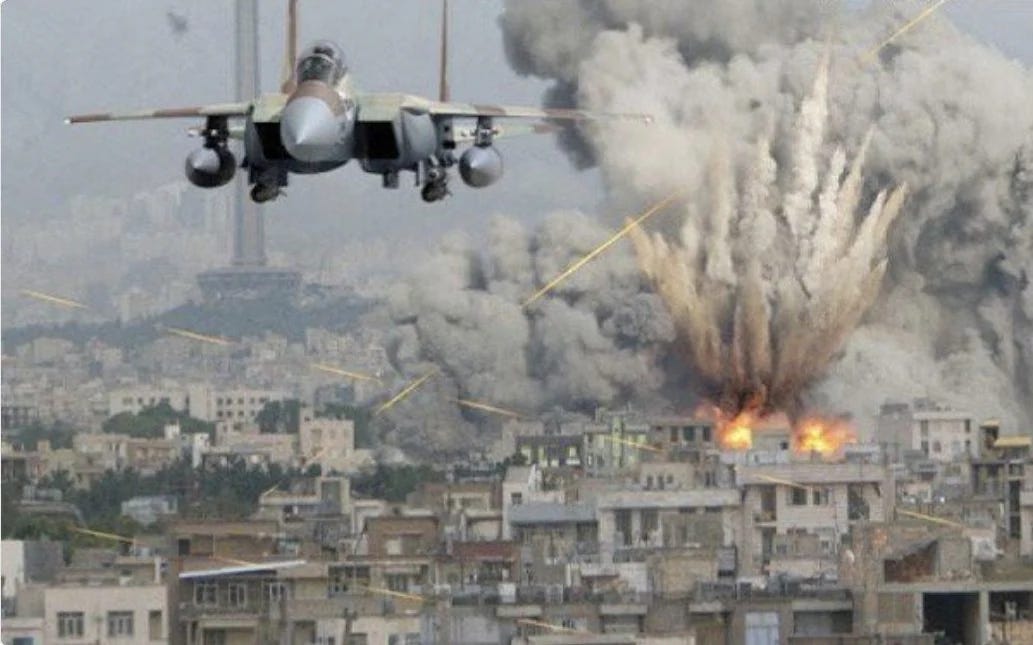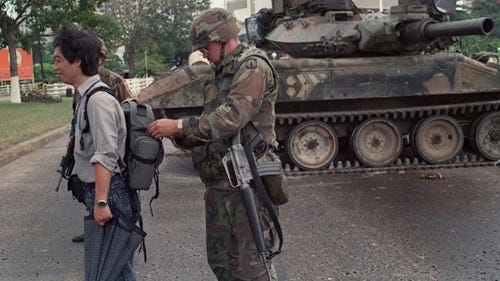Questions loom over Iran war - what just happened there?
Wars from Europe to West Asia to Africa are inter-related
The mongers haven't finished in Iran nor in Europe and it may yet spread
Preference for force over negotiation stems from bombing Yugoslavia in the '90s
Reviving NATO, humbling Europe and neutralising the threat of the euro
Like the invasion of Panama these set the stage for post-Cold War conflict
The monetary causes of war get too little attention; some are allergic to numbers
Civilians became collateral damage; oil and mineral assets became collateralised
Rearmament is pretext for austerity, digital ID, conscription and rationing of life
Related:
Nukes, Drones & Bonds - Musings on the cost & duration of war (Jun 04, 2025)
Georgia Next In Brussel's Conquest - EurasiaNote 98 - EU's expansion driven by internal crisis (Oct 26, 2024)
Nazi Bargain And The Post-War Order - Part 1: Did the WW2 settlement cloak plans to revive the fascist project? (Oct 27, 2021)
Europe Elections: More War And Degrowth - Despite a 'right rally' the toxic project continues (Jun 11, 2024)
Trump Peacemaker Or Man Beyond Time - The pace of change has accelerated rapidly within weeks (May 15, 2025)
Ukraine's Attack On Russia's Deterrent Risks Nuclear War - Eurasia note #108 - Bombs air bases on the eve of peace talks in Turkiye (Jun 02, 2025)
Western Countries Need Enemies - But Whom? - Britain's surrender of Diego Garcia reveals a contradiction (May 23, 2025)
Trump Tariffs: Blessing Or Curse - Echoes of Nixon's dollar revolution (Apr 05, 2025)
(2,500 words or 10 minutes of your company)
June 26, 2025
The first casualty of war is truth. The attack by the U.S. and Israel on Iran was marked by deception, the pretence of negotiations, then the killing of negotiators and military leaders with their families.
Even by the standards of wartime propaganda, it is difficult to sort the wheat from the chaff to discern the logic of war.
Prime minister Benjamin Netanyahu has predicted for 30 years that Tehran was on the brink of acquiring nukes; it is also true that three years after president Donald Trump pulled out of the nuclear deal, Iran began enriching uranium in 2021, beyond the 3-5 per cent needed for nuclear power.
What has been done has been done. Even if Iran had nuclear weapons, attacking atomic facilities means nothing is off-limits. Nuclear deterrence is not dead, but it's walking wounded.
Likewise the chance of the ceasefire holding is, on Israel's historical record, slim.
Most important, the various wars from Europe to West Asia to Africa are inter-related because, as our own military declares, war nowadays is hybrid.
That means cyber war, information war, those things you get prosecuted for mentioning like weaponised migration or weaponised medicine, and the war on farmers, food, supply chains and the war on energy.
This is not a prediction; it's already happening with the detonation of the Nord Stream pipeline accelerating the de-industrialisation of Europe's manufacturing hub, Germany. Will the Strait of Hormuz be next?
Dark side
The intelligence agencies serve those who seek power and profit from war; a self-regarding elite, capable of doing anything. They themselves call it going over to the dark side.
The cultivation by the British of religious extremism, exemplified by Syria's new government of "moderate head choppers," goes back almost 200 years. Israel's policy, of pitting Hamas against more secular Palestinians, is Britain's. George Orwell described in Nineteen Eighty-Four the psyop of our enemy, and our enemy's enemy, with a periodic switcheroo.
The commentariat is in a flutter:
Was the U.S. suckered into the attack by reports that Iran was close to making a nuclear bomb, reports that were subsequently walked back?
Or did president Donald Trump masterfully take the lead, in order to head off and ultimately defuse the war?
Will Trump return to bombing Iran, having said that it cannot have nuclear enrichment, even for civilian nuclear power?
Money power
Few people pay attention to the money. And when they do, they see it only in terms of, can the U.S. keep printing dollars and support Israel.
This misses the point that money is the alpha and omega of war.
The usual causes to which war is attributed — human depravity, monomaniacal ambition or an arms race — are constants and do not account for cycles of war.
This may seem strange to those who grew up in the Cold War, or who followed the collapse of the Soviet Union, but Edward Beach Howell, in 1925 for The Atlantic, noted that historically wars tended to arrive in cycles, punctuated by eras of peace. [1]
What also moves in cycles are moral values, the psychological tolerance for certain behaviours, the zeitgeist. But what, he asked, causes that change in world mood?
Insecurity, caused in large part by rising prices and inflation. To which we might add displacement, that primeval fear that someone is taking what’s rightly yours — weaponised in our era by open borders — which likewise affects the price and availability of resources.
It's agreed that inflation is an effect of war but less attention is paid to it being a cause, except by the likes of economist Martin Armstrong who shows that wars are often an excuse to default on a failing monetary system.
Monetary crisis
Beach Howell found that war cycles coincided with peaks of money-metal production, in the 16th century in Bolivia, the 18th across South America, the 19th century gold rush in Australia and California, and the British conquest of South Africa's gold and diamonds just before WW1.
Despite an era of fiat, paper money, we face similar risks from hyper-financialisation. It raises prices, increases the unfair distribution of wealth, while de-industrialising, leaving the masses more vulnerable and increasing dependence on complex global supply chains. It increases debt burdens and volatility in the bond markets, and weaponises finance, through sanctions and exclusion from the markets, or by increasing competition for resources.
Unlike centuries past, today's monetary crunch cannot be solved by taking over somebody's gold mines, but commodities, minerals and energy still play a role because they allow bankers to gain control of another country's assets and use them as collateral to profit from lending against them.
This is why we focus on the money power, the bankers rather than the oil companies per se, for the latter may acquire licences and borrow from local banks. It is specifically bankers who gain from resource wars in which they gain not only control but can lend against the asset.
Force over negotiation
We spoke earlier about wartime propaganda. The current characterisation or flavour of war dates from a specific time and place: the creation of the bogeyman — Slobodan Milosevic in Yugoslavia in the 1990s, and Manuel Noriega in Panama a couple of years before.
During the Cold War the enemy had been communism, the threat mutually assured destruction, not Stalin or Khrushchev. Now every war has its Saddam, Gaddafi, Putin or Khamenei.
This is strategic, in order to resort to force over negotiation because "you can't negotiate with that man."
The invasion of Panama in December 1989, now largely forgotten, came one month after the fall of the Berlin Wall and set the template for conflict after the end of the Cold War.
Keep reading with a 7-day free trial
Subscribe to Moneycircus to keep reading this post and get 7 days of free access to the full post archives.




